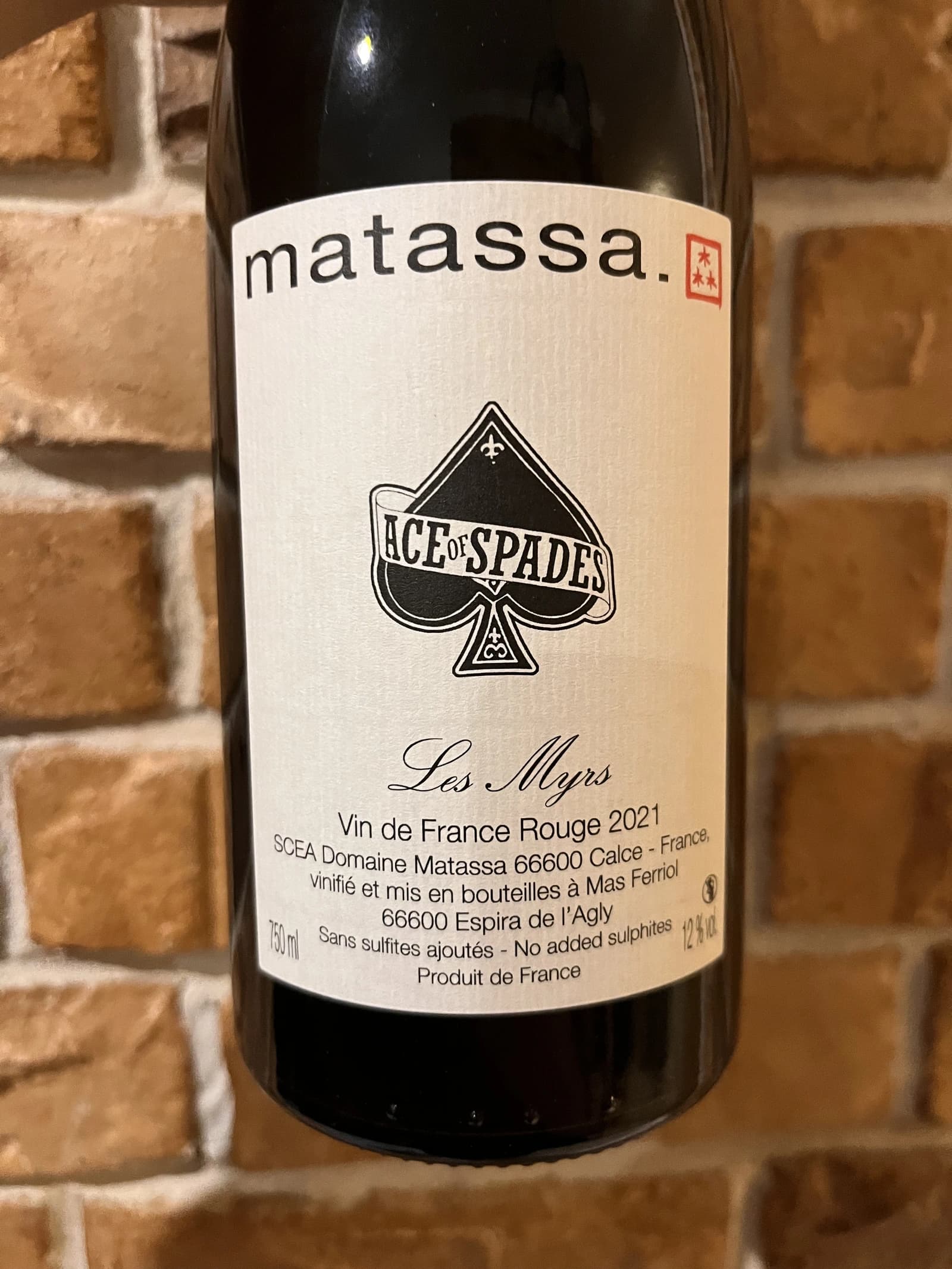Matassa Ace of Spades Les Myrs 2021

Le Myrs Ace Of Spades is a blend of Cariñena (Carignan) and Monastrell (Mourvèdre). The name "Les Myrs" refers to the dark soils of the vineyard, where they came from. It has a short maceration of 4 days and is aged for 5 months on its lees in concrete tanks. It is bottled without filtering or fining, and of course, without additives or sulphur.
Ratings
The last time I tasted this wine, we wondered if it would be easy to guess its colour if served in opaque glasses. I could not miss this opportunity. As a result, all eleven convives assumed it was macerated white. I guess opinions are contagious. This is what I call 'fun'.
It's still a bit edgy but somehow more complete than a month ago. Still tries to bite you with VA and fizziness but quickly calms and licks you. Plums, black currant, barnyard, tapenade and liquorice. Fresh, sophisticated and delicious.
Unlike other fresh releases of Matassa, this one is edgy and bites a bit. Will keep a bottle or two to taste later. A funky bouquet of barnyard, black currant and tapenade. Playful palate with high acidity and tannin. IMO it slightly lacks balance today, but overall it's sophisticated and highly enjoyable wine.
About Producer
- Tom Lubbe, hailing from New Zealand, refined his winemaking approach in South Africa, where he embraced natural techniques and an appreciation for Mediterranean varieties. His journey led him to Roussillon, where at Matassa, he's renowned for championing minimal intervention and authentically expressing the unique terroir. - Nestled near the Pyrenees in Roussillon, Matassa is cradled by a mosaic of schist, marl, black slate, and black marl, setting a dramatic stage for the vines to thrive directly on the mother rock — a stark contrast to the topsoil-centric vineyards of neighbouring Languedoc. The domaine's treasure is its venerable vines, some witnessing over a century, and a diverse palette of grape varieties, including indigenous gems like Carignan and Macabeu, alongside less conventional picks, painting a complex portrait of flavours and textures. - The signature of Matassa's wines lies in their elegant restraint — light, approachable, yet brimming with a quiet intensity. Each bottle encapsulates a harmonious balance, offering a juicy, vibrant, and thought-provoking sip that mirrors Tom Lubbe's personal palate.
Domaine Matassa, nestled in Calce within the Val d'Agly area of Roussillon, spans about 20 hectares of naturally tended vineyards. The vines, aging from 30 to 115 years, thrive in this unique terrain, focusing on Northern Catalunya's native varieties like Grenache Gris, Maccabeu, Muscat d'Alexandrie, Lladonner Pelut (Catalan Grenache), Carignan, and Mourvedre. The result? Wines distinct for their moderate alcohol, subtle tannins, and understated oak, marked by vibrant acidity and a profound mineral freshness.
The driving forces behind Matassa are Tom Lubbe, his spouse Nathalie Gauby, and Sam Harrop MW. Tom, a New Zealander with roots in South Africa, was mentored by Louise Hofmeyer, whose devotion to indigenous yeasts and restrained yields influenced him greatly. His curiosity about Mediterranean varietals led him to Domaine Gauby in Calce, where a brief stint in 1999 evolved into a deeper engagement, thanks to Gérard Gauby's camaraderie.
It was here, amidst the vines, that Tom and Gérard's sister, Nathalie, forged a bond, leading to marriage and the decision to lay down roots in Roussillon, giving life to Matassa in 2003 (after giving life to their first child). Their humble beginnings saw their first vintage crafted in their living room, a situation that prompted Gérard to generously offer the old Gauby cellar in 2004.
Matassa's wines are a testament to evolving practices. The vineyards, organically certified by Ecocert, eschew chemical treatments, focusing instead on cover crops that (according to Tom) have notably decreased the alcohol content from 13.5% in 2005 to 10.5% in 2018. Early harvesting, particularly of Muscat in August, and the flourishing insect life enhancing soil health, are credited (by Tom) for the nuanced flavors in their wines.
In the cellar, changes are equally pronounced. All wines are now labeled Vin de France to be free from the regulatory shackles, embracing unconventional methods like skin maceration for whites, following "Alexandria" 2008, his first macerated white; and prioritizing whole-cluster infusions over maceration for reds. Oak, if used, is for aeration, not structure, and longer elevage is bypassed in favor of capturing the wine's inherent essence sooner.
Matassa's influence extends beyond its bottles. As a beacon in the winemaking community, it attracts and mentors the next generation of vintners, all drawn by Tom Lubbe's legacy and expertise.